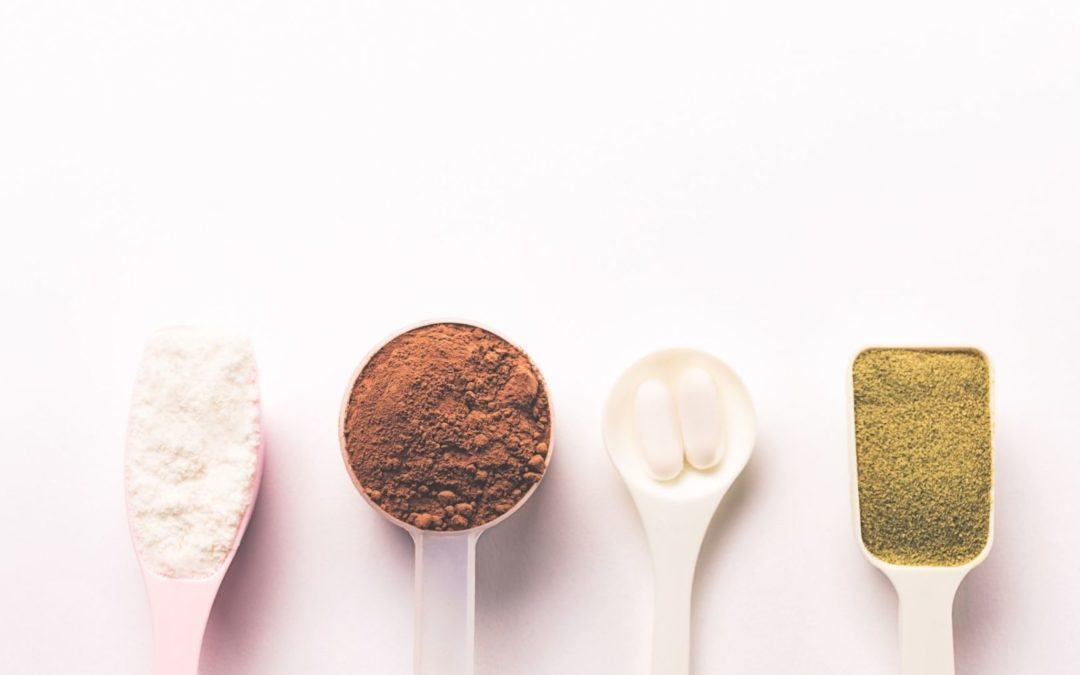,By now, most of us, especially those involved in the world of fitness, are familiar with protein powders and their presumed benefits. But what is all the hype really about? Can protein powders and protein supplementation really make a difference in athletic performance and recovery? What protein powders should we be buying when there are so many options available? In today’s blog we will break down the different types of protein, their uses, and our expert recommendations on the highly requested topic of protein powders.
Breaking Down Protein Powders
There are four main categories of protein powder on the market:
- whey protein
- casein protein
- egg protein
- plant-based protein.
While all protein powders serve a main purpose being protein supplementation, each type of protein powder contains different specific ingredients that are broken down and utilized by the body in unique ways.
Amino Acids
Before we break down the different types of protein let’s take a look at one of the key factors of protein powders: amino acids. Amino acids are considered the foundation protein. They play an important role in several processes in the body such as building protein and synthesizing hormones and neurotransmitters. There are three types of amino acids: essential amino acids, conditionally essential, and nonessential.
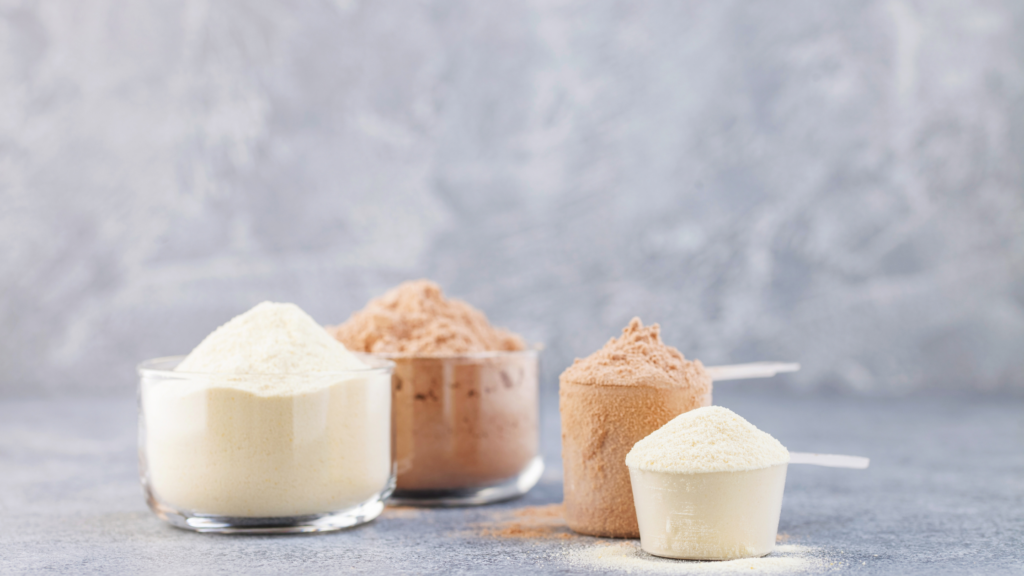
Nonessential amino acids are the ones that can be synthesized by the body. The conditionally essential amino acids are amino acids that are only considered essential in times of illness or stress. Finally, essential amino acids are the amino acids the body cannot produce and we must get from food. Essential acids are present in every protein powder and help support vital processes in the body. The amount of essential amino acids a protein powder contains per serving is determined by the sources of protein.
Types of Protein Powder
Whey Protein
Whey protein is one of the most common forms of protein powder and is the main protein found in dairy products. It contains the highest percentage (43%) of all of the 9 essential amino acids. The 9 essential amino acids are histidine, isoleucine, leucine, lysine, methionine, phenylalanine, threonine, tryptophan, and valine. Whey protein takes the least time to digest making it one of the most popular. There are two primary forms of whey protein: whey protein concentrate (WPC) and whey protein isolate (WPI).
Whey protein concentrate is closest to the naturally occurring form of whey. It contains small amounts of fat and carbs along with the protein. Whey protein isolate contains a higher protein percentage and lower carb and fat percentages compared to WPC. Think of WPI as the more “filtered” option with a higher percentage of faster digesting protein.
Casein Protein
Casein is also a dairy protein that contains all the essential amino acids the body needs. Compared to whey protein, casein has 10% less essential amino acids. Casein also takes longer to digest than whey protein, which prolonges the release of essential aminoa cids into the bloodstream. This can give the body a more steady exposure to the amino acids and help reduce the rate of muscle protein breakdown.
Egg Protein
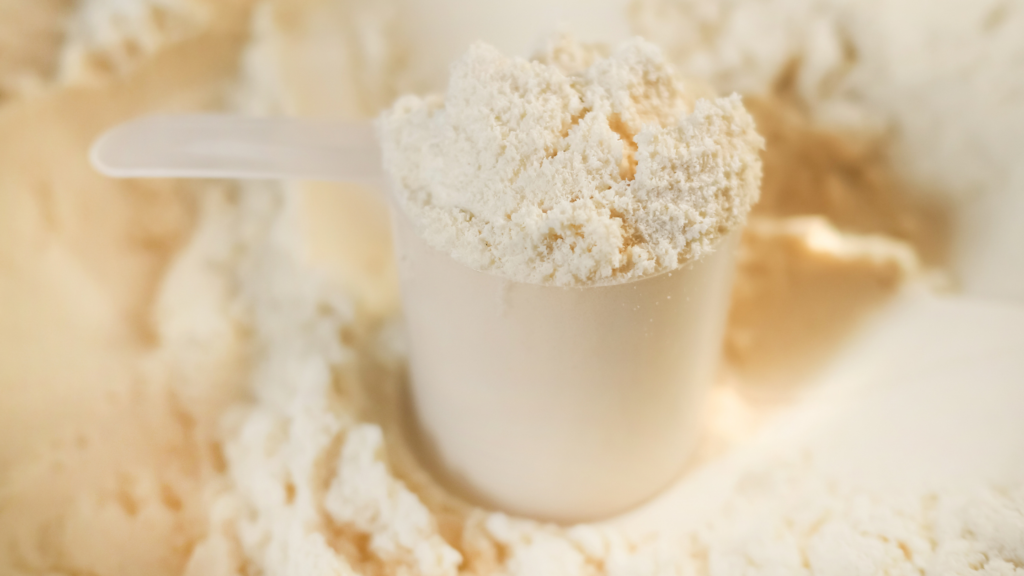
Egg protein powder is made from the powdered form of egg white, the part of the egg containing the greatest protein content. Similar to casein and whey protein, egg protein has one of the highest “protein digestibility-corrected amino acid scores” which ranks it as a high quality protein source.
In addition, egg protein contains a slightly lower percentage of essential amino acid at 32% and a lower leucine percentage when compared to whey and casein. This basically means that you will still get all your necessary amino acids from this source, they are simply less concentrated and contain less per serving. This can be important to consider when picking a protein powder, especially if you are looking for one with a higher amount of BCAA’s like leucine, isoleucine, and valine. Also, the digest rate for egg protein is right in between the fast digesting whey protein and the slower digesting casein protein. This makes it a more versatile protein source when it comes to protein synthesis and slowing muscle protein breakdown.
Plant-Based Protein
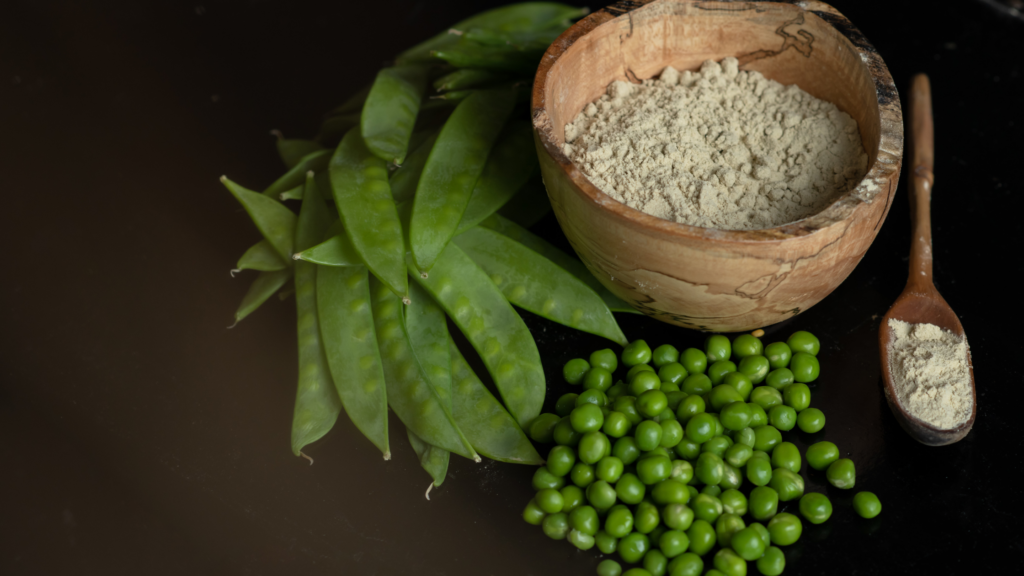
Plant-based protein powders are a good idea for those who cannot digest animal based or dairy products. Common sources of plant-based protein powders include soy, pea, hemp, oat, and brown rice. The overall protein content of plant-based proteins is naturally slightly lower than animal-based proteins. The essential amino acid content of these protein powders is nearly 50% less than whey, casein, and egg proteins. Even within different plant-based protein powders, the essential amino acid and leucine content varies.
Protein Powder Recommendations
But, how exactly do you know which protein powder is best for you? Before we can make any concrete recommendations we need to acknowledge that the research regarding the benefits of supplemental protein powder is lacking. Simply put, there is a lot we don’t know. However, there is enough research on protein and its impact on the body that we can use as a guide when discussing the use of protein powder.
Here’s what we do know: consuming adequate amounts of quality protein is necessary for maintaining and building muscle mass, recovering after exercise, and maintaining a healthy weight.
Meeting Protein Needs
The Academy of Nutrition and Dietetics (AND) recommends that non-athletes consume approximately 0.8 grams of protein per day per kilogram of body weight. However, athletes need 1.2-2.0 grams of protein per day per kilogram of body weight. In addition, The Academy recommends the regular spacing of high-quality protein after exercise and throughout the day in increments of 0.3 grams of protein per kilogram of body weight.
A majority of individuals can meet these recommended daily requirements through a mixture of animal-based and plant-based protein sources alone – a great example is a Burrito Bowl that contains both grilled chicken and black beans for protein. Another way to get in complete protein sources is through eating a variety of foods such as pairing Thai Peanut Tofu with a whole grain like brown rice. However, athletes or individuals who have trouble getting that protein in through food first could benefit from a protein supplement in the form of protein powder.
The type of protein powder you choose depends on what you are trying to achieve.
What Protein Should I Buy?
Weight Loss and Weight Management
If you are looking for a protein powder supplement to help with weight loss or weight management, first look for a protein powder that is lower in sugar and branched chain amino acids (BCAA’s) since these can encourage weight gain. A plant-based or egg protein powder might be a good place to start since they can help increase your overall protein consumption which is necessary for healthy weight loss.
Recovery
If you are looking for a protein powder supplement to aid in recovery post workout or at night, a casein based protein powder might be your best option since its slow release and digestion can help increase muscle growth and supply the muscles with enough protein overtime to slow muscle breakdown following a workout.
Muscle Growth
If you are wanting to encourage muscle growth, you may consider a whey protein powder, specifically a whey protein isolate, that is easily and quickly digested can further aid in protein muscle synthesis.
Our McDaniel Nutrition Therapy Favorites
You might be wondering if we as dietitians take protein powder supplements and which brands we recommend. Check out a few of our favorites below!
If you’re a runner or fitness enthusiast and are looking for a protein powder to use as a recovery snack, Jen recommends the Biochem Vanilla Whey Protein Isolate Protein Powder. She likes to mix it with some banana and peanut butter to get some quick nutrition in after a workout.
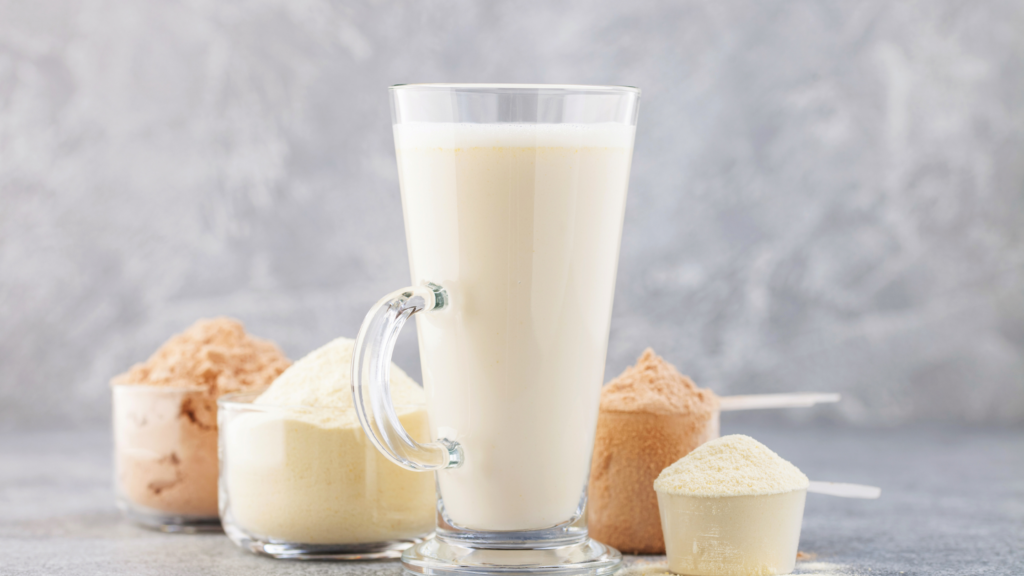
For those who are interested in an egg protein powder, Haley regularly uses the Totally Egg Natural Egg White & Yolk Protein Powder. She suggests mixing it into a smoothie or other flavored foods since the natural flavors can be – well, a little egg-y. She also loves the 1st Phorm Protein Powders which were started right in St. Louis. They have a ton of different flavors to choose from. They are also lower in lactose which is perfect for anyone who has a lactose sensitivity.
For plant-based protein powders, our Dietetic Intern, Karly recommends the Vega Vanilla Protein and Greens since it is packed with extra nutrients and contains pea protein and brown rice proteins. She also likes the Garden of Life Raw Organic Vanilla Protein since it is also pea protein based and contains eight of the nine essential amino acids – plus it’s vegan and gluten-free.
As always, it is important to listen to your body to see how protein supplementation feels for you and if it is even necessary. However, protein supplementation is not for everyone. It is always a good idea to try meeting your recommended protein needs through foods first by consuming lean meats, fish, legumes, nuts, and seeds!
This article was written by Saint Louis University Dietetic Intern, Karly Wilson.
References
Gorissen, S. H. M., Crombag, J. J. R., Senden, J. M. G., Waterval, W. A. H., Bierau, J., Verdijk, L. B., and van Loon, L. J. C. (2018). Protein content and amino acid composition of commercially available plant-based protein isolates. Amino Acids 50, 1685-1695. Doi: 10.1007/s00726-018-2640-5,
Thomas, D. T., Erdman, K. A., and Burke, L. M. (2016). Position of the Academy of Nutrition and Dietetics, Dietitians of Canada, and the American College of Sports Medicine: Nutrition and Athletic Performance. From the Academy Position Paper, 116(3), 501-528. doi: https://doi.org/10.1016/j.jand.2015.12.006.
Rutherfurd, S. M., Fanning, A. C., Miller, B. J., Moughan, P. J. (2014). Protein digestibility-corrected amino acid scores and digestible indispensable amino acid scores differentially describe protein quality in growing male rate. The Journal of Nutrition, 145(20), 372-379. doi: https://doi.org/10.3945/jn.114.195438.
Butley, N. (2018, September). What are the benefits of protein powder? Medical News Today. https://www.medicalnewstoday.com/articles/323093.

